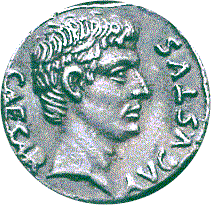Chief architect of the Roman empire & one
of the most influential rulers in ancient history. Gaius Octavius Caepias was a talented 18
year old when he was adopted by his great-uncle,
Julius Caesar
[in the dictator's last will] & officially renamed Gaius Julius
Caesar Octavianus (45
BCE). When Caesar was assassinated less than a
year later, Octavian won enough popular, military & senatorial
support to be appointed consul of Rome at the age of 19. He negotiated a 5
year alliance with Marc
Antony & Lepidus---the
2nd triumvirate---which reorganized the Roman state (43 BCE)
& led to the elimination of thousands of Julius Caesar's
political opponents.
After their victory over Caesar's
assassins [Cassius
& Brutus] at Philippi, the triumvirs split the Empire.
Octavian assumed control of an Italy torn by civil war. Though not
himself a great soldier, he was able to pacify the peninsula with
the aid of his loyal friend, Marcus
Agrippa, the best naval
strategist of the time. At the same time he began a shrewd campaign
to win the support of Romans of all classes by his public
championship of traditional Roman civil religion. Capitalizing on
the Senate's deification of Julius Caesar, he began to style himself
"Caesar, son of a god" [Latin: filius dei; Greek:
huios theou]. While Antony basked in royal luxury in Egypt
& publicly endorsed the royal pretensions of Julius Caesar's
natural son by Cleopatra (Caesarion), Octavian made a point of
identifying with the simpler life-style & traditional republican
values of average Roman aristocrats. Thus, he won the allegiance of
Romans who had an aversion to monarchy.
After Agrippa's victory at Actium
over the combined fleets of Antony & Cleopatra (31 BCE) &
his own conquest of Egypt Octavian was in fact sole master of the
Roman world. But the only office he held was a string of one year
appointments as consul. The only titles he used were
"commander" [imperator] & "first
citizen" [princeps]. Four years after his triumph he
retired from public office in Rome & officially transferred
governing powers back to the Senate & people. Yet he maintained
personal control of the army & adopted the honorific title
"Augustus," which gave his actions a religious authority
that transcended any office in Roman society. Though officially
retired from public life, he worked tirelessly despite fragile
health to reform the political & social structure of the Roman
state, producing a long string of projects & edicts that were
ratified by the Senate. Rather than personally engaging in military
campaigns, he relied on professional soldiers like Agrippa & his
stepson, Tiberius.
The pax Romana allowed him to spend most of his own time in
planning virtually every aspect of civic life: from a centralized
economy to a system of highways to support for the arts &
religion. Thus, he was personally the architect of the empire that
became the basis of western society & culture. The Roman Senate
declared him a god less than a month after his death.
Augustus' personal life, on the other
hand, was a series of disappointments & disasters. He had no son
& his only daughter's sons all died before him. So, he was forced to
adopt his wife's son, Tiberius, whom he disliked. In public Augustus
posed as champion of traditional family values; but the intrigues
& scandalous behavior of his own family, including his wife,
daughter & their children produced one of history's most lurid
soap operas, complete with the murder of kin, public debauchery
& incest.
Augustus himself was not innocent of
plotting executions to eliminate personal enemies. He favored
loyalists like Herod
who controlled their subjects, whatever the method. In fact, when he
found that Herod was more effective in suppressing revolts than
Roman governors, he named him procurator of all Syria (20 BCE),
subject only to his own vice-regent [Agrippa] & personal
legates. Yet, he was swift to remove those who [like his fellow triumvir
Lepidus] challenged his own authority or who [like Archelaus]
could not silence protests. In running the empire as a centralized
corporation, he was more concerned to suppress public dissent than
to promote social justice. Thus, he was also the father of the
totalitarian state.
References:
Josephus,
Antiquities
14.301,383-388, 403.
15.109-, 121, 161-167, 183-201, 215-221, 336-364.
16.90-132, 161-173, 270-273, 340-358.
17.190, 202--252, 297-324, 342-348, 355.
18.1, 26-33.
______, War
1.283-285, 298, 386-415, 451-459, 531-538, 620-625,
640-646.
2.17-19, 24-39, 78-83.
Suetonius,
Augustus 1-101.
Cassius Dio, Roman
History 45-56.
Other
resources on line:


![]()
![]()

![]()
![]()
![]() Perspective on the
World of Jesus
Perspective on the
World of Jesus ![]()